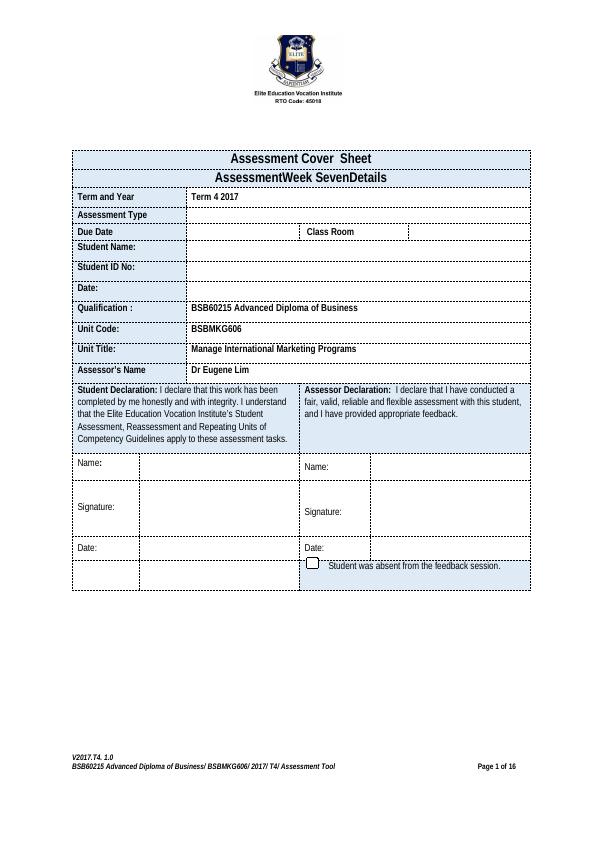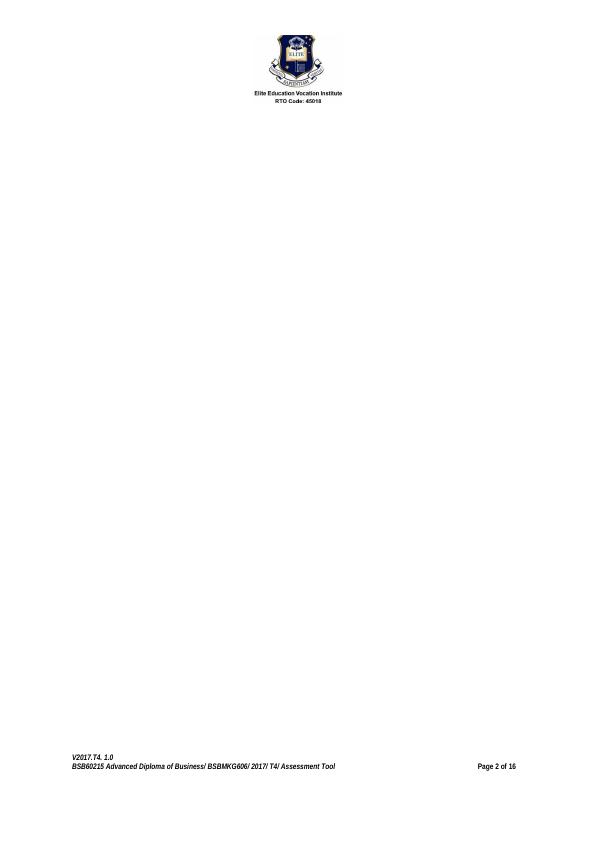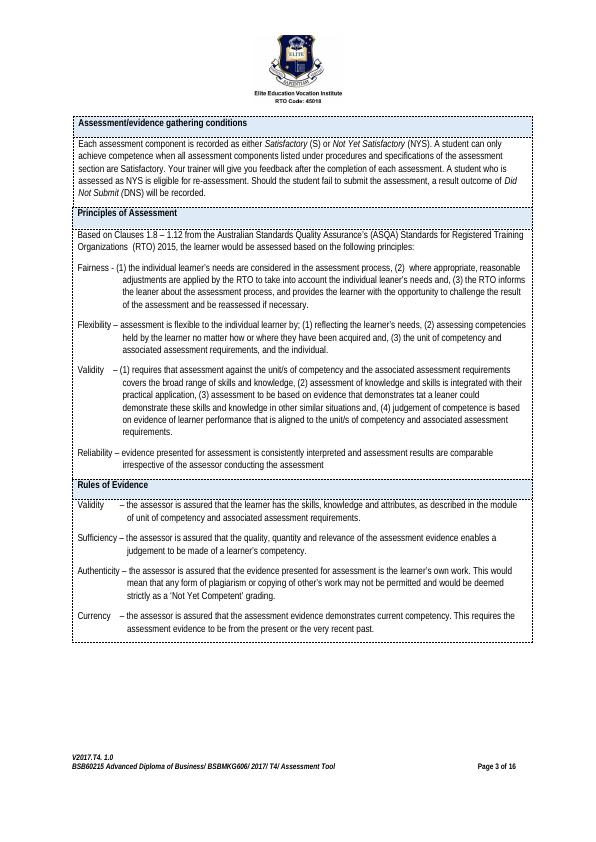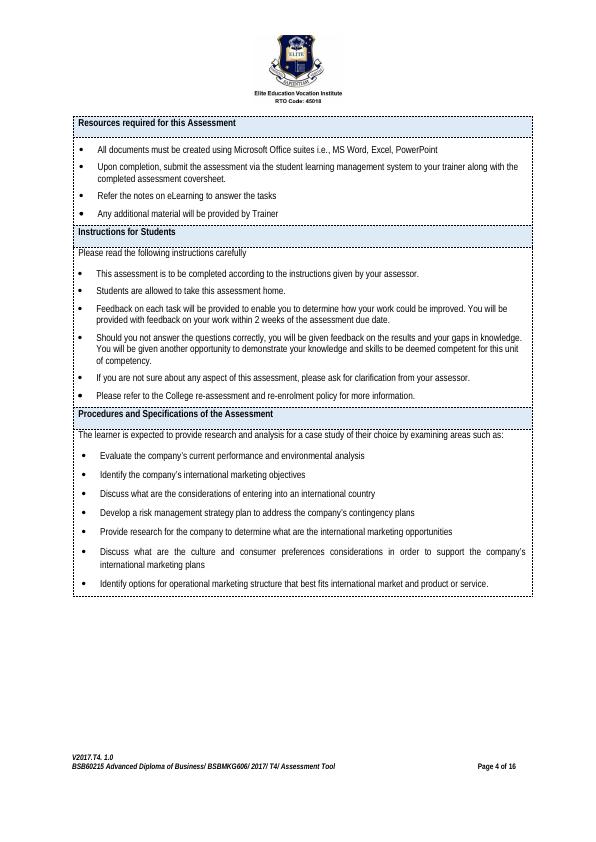BSBMKG606: Manage International Marketing Assignment
16 Pages2993 Words283 Views
Added on 2020-05-16
BSBMKG606: Manage International Marketing Assignment
Added on 2020-05-16
ShareRelated Documents
Assessment Cover SheetAssessmentWeek SevenDetailsTerm and YearTerm 4 2017Assessment TypeDue Date Class RoomStudent Name:Student ID No:Date:Qualification :BSB60215 Advanced Diploma of BusinessUnit Code:BSBMKG606Unit Title:Manage International Marketing ProgramsAssessor’s NameDr Eugene LimStudent Declaration: I declare that this work has been completed by me honestly and with integrity. I understand that the Elite Education Vocation Institute’s Student Assessment, Reassessment and Repeating Units of Competency Guidelines apply to these assessment tasks.Assessor Declaration: I declare that I have conducted a fair, valid, reliable and flexible assessment with this student, and I have provided appropriate feedback.Name: Name: Signature:Signature: Date: Date: Student was absent from the feedback session.V2017.T4. 1.0BSB60215 Advanced Diploma of Business/ BSBMKG606/ 2017/ T4/ Assessment Tool Page 1 of 16

V2017.T4. 1.0BSB60215 Advanced Diploma of Business/ BSBMKG606/ 2017/ T4/ Assessment Tool Page 2 of 16

Assessment/evidence gathering conditionsEach assessment component is recorded as either Satisfactory (S) or Not Yet Satisfactory (NYS). A student can only achieve competence when all assessment components listed under procedures and specifications of the assessment section are Satisfactory. Your trainer will give you feedback after the completion of each assessment. A student who is assessed as NYS is eligible for re-assessment. Should the student fail to submit the assessment, a result outcome of Did Not Submit (DNS) will be recorded.Principles of AssessmentBased on Clauses 1.8 – 1.12 from the Australian Standards Quality Assurance’s (ASQA) Standards for Registered Training Organizations (RTO) 2015, the learner would be assessed based on the following principles:Fairness - (1) the individual learner’s needs are considered in the assessment process, (2) where appropriate, reasonable adjustments are applied by the RTO to take into account the individual leaner’s needs and, (3) the RTO informsthe leaner about the assessment process, and provides the learner with the opportunity to challenge the result of the assessment and be reassessed if necessary.Flexibility – assessment is flexible to the individual learner by; (1) reflecting the learner’s needs, (2) assessing competenciesheld by the learner no matter how or where they have been acquired and, (3) the unit of competency and associated assessment requirements, and the individual.Validity – (1) requires that assessment against the unit/s of competency and the associated assessment requirements covers the broad range of skills and knowledge, (2) assessment of knowledge and skills is integrated with their practical application, (3) assessment to be based on evidence that demonstrates tat a leaner could demonstrate these skills and knowledge in other similar situations and, (4) judgement of competence is based on evidence of learner performance that is aligned to the unit/s of competency and associated assessment requirements. Reliability – evidence presented for assessment is consistently interpreted and assessment results are comparable irrespective of the assessor conducting the assessmentRules of EvidenceValidity – the assessor is assured that the learner has the skills, knowledge and attributes, as described in the module of unit of competency and associated assessment requirements.Sufficiency – the assessor is assured that the quality, quantity and relevance of the assessment evidence enables a judgement to be made of a learner’s competency.Authenticity – the assessor is assured that the evidence presented for assessment is the learner’s own work. This would mean that any form of plagiarism or copying of other’s work may not be permitted and would be deemed strictly as a ‘Not Yet Competent’ grading.Currency – the assessor is assured that the assessment evidence demonstrates current competency. This requires the assessment evidence to be from the present or the very recent past. V2017.T4. 1.0BSB60215 Advanced Diploma of Business/ BSBMKG606/ 2017/ T4/ Assessment Tool Page 3 of 16

Resources required for this AssessmentAll documents must be created using Microsoft Office suites i.e., MS Word, Excel, PowerPointUpon completion, submit the assessment via the student learning management system to your trainer along with the completed assessment coversheet.Refer the notes on eLearning to answer the tasksAny additional material will be provided by TrainerInstructions for StudentsPlease read the following instructions carefullyThis assessment is to be completed according to the instructions given by your assessor.Students are allowed to take this assessment home.Feedback on each task will be provided to enable you to determine how your work could be improved. You will be provided with feedback on your work within 2 weeks of the assessment due date.Should you not answer the questions correctly, you will be given feedback on the results and your gaps in knowledge. You will be given another opportunity to demonstrate your knowledge and skills to be deemed competent for this unit of competency. If you are not sure about any aspect of this assessment, please ask for clarification from your assessor.Please refer to the College re-assessment and re-enrolment policy for more information.Procedures and Specifications of the AssessmentThe learner is expected to provide research and analysis for a case study of their choice by examining areas such as:Evaluate the company’s current performance and environmental analysisIdentify the company’s international marketing objectivesDiscuss what are the considerations of entering into an international countryDevelop a risk management strategy plan to address the company’s contingency plansProvide research for the company to determine what are the international marketing opportunitiesDiscuss what are the culture and consumer preferences considerations in order to support the company’sinternational marketing plansIdentify options for operational marketing structure that best fits international market and product or service.V2017.T4. 1.0BSB60215 Advanced Diploma of Business/ BSBMKG606/ 2017/ T4/ Assessment Tool Page 4 of 16

End of preview
Want to access all the pages? Upload your documents or become a member.
Related Documents
BSBMKG501 Identify And Evaluate Marketing Opportunities Assignmentlg...
|18
|3344
|202
BSBINN501 Establish Systems that Supports Innovationlg...
|16
|3395
|226
Report on Establish and Adjust the Marketing Mixlg...
|14
|3239
|52
Term and Year 2017 Assessment Cover Sheetlg...
|15
|2950
|440
FNSACC502 Income Tax Returns for Individuals Assessment Cover Sheetlg...
|20
|4625
|77
Financial Reports for Corporate Entities Assignmentlg...
|9
|1816
|269
